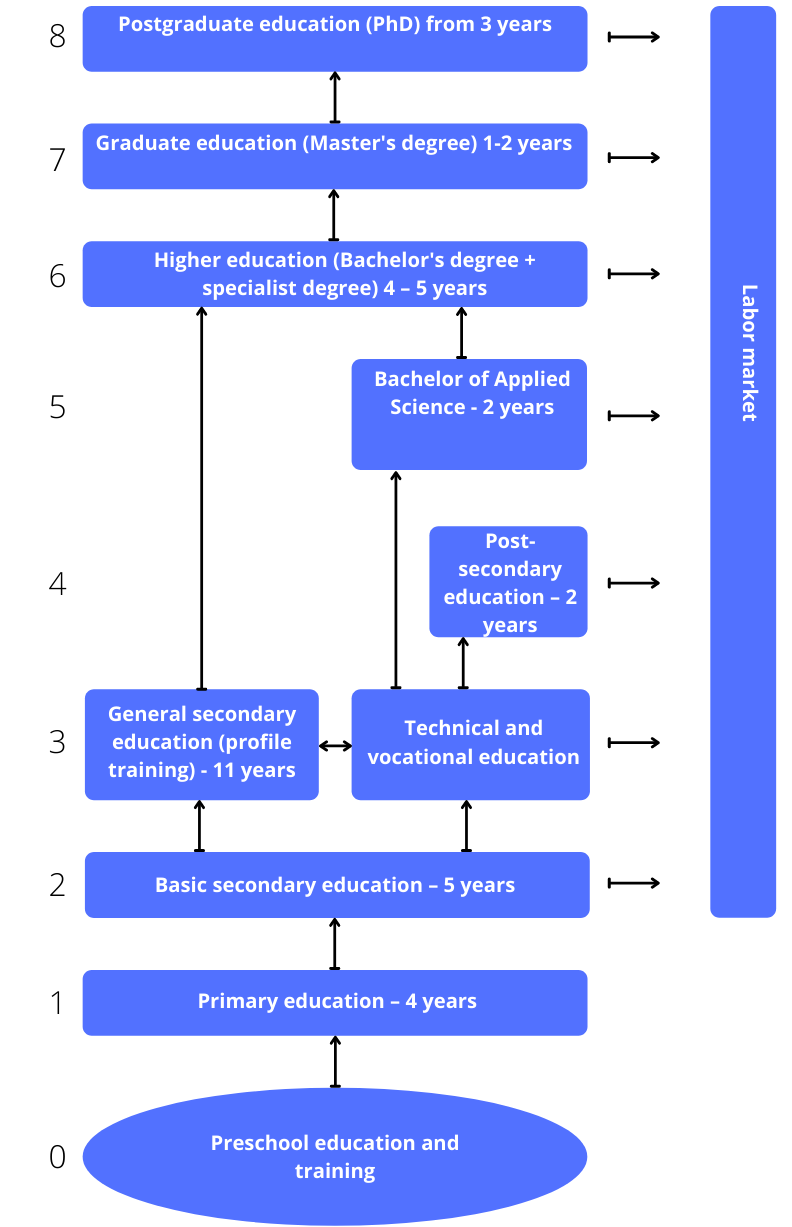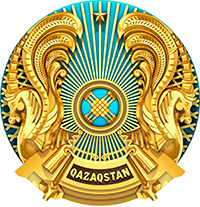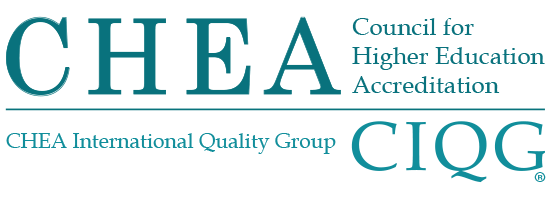HIGHER EDUCATION IN KAZAKHSTAN
According to the Bureau of National Statistics of the Agency for Strategic Planning and Reforms of the Republic of Kazakhstan, at the beginning of the 2023-2024 academic year in the Republic of Kazakhstan, the number of operating higher education institutions amounted to 112 organizations, including 77 universities, including research, 14 academies, 10 institutes, and equivalent conservatories, higher schools and higher schools, 8 national higher education institutions educational institutions, 3 national research universities.
Over the years of independence, the state has implemented large-scale reforms in the higher education system to improve the quality of specialist training. In 2010, Kazakhstan became a participant in the Bologna process; qualification requirements for licensing higher education institutions were strengthened; a ban on the activities of university branches was introduced; in 2018, legislative changes were made to expand the academic and managerial independence of universities; 27 state universities were transformed into non-profit joint-stock companies; and the League of Academic Integrity was established as an independent organization with On January 1, 2019, distance learning was canceled, and in recent years, the rules for admission to universities for grants have been strengthened.
At the beginning of the 2023-2024 academic year, the total number of students at universities amounted to 635,157 people, of whom 592700 were enrolled in bachelor's degree programs, 36491 in master's degree programs, and 5966 in doctoral programs.
The total number of teaching staff at the beginning of 2022-2023 amounted to 36.4 thousand teachers, of whom masters made up 39%, candidates of sciences - 29%, associate professors - 13%, doctors of philosophy (PhD) - 10%, doctors of sciences - 7%, professors - 6% and doctors in the profile - 1%.

The education system of the Republic of Kazakhstan is characterized by multilevel and continuous development and includes the following levels of education:
- 0. Preschool education and training – 1/6 years
- 1. Primary education (4 years); entry - 6/7 years.
- 2. Basic secondary education; entry - 10/11 years.
- 3. Secondary education; entry - 15/16 years.
- - general secondary education;
- - technical and professional education: qualifications of a worker and a mid-level specialist, entry - 15/16 years;
- 4. Post-secondary education: qualifications of a worker with a high level of discharge; entry - 17/18 years.
- 5. Incomplete higher education – applied bachelor's degree; admission - 17/18 years.
- 6. Higher education: bachelor's degree, specialist qualifications for medical specialties; admission – 17/18 years.
- 7-8. Postgraduate education: Master's and PhD degrees.
The structure of higher and postgraduate education of the Republic of Kazakhstan is regulated by the Law "On Education" (dated July 27, 2007). With the signing of the Bologna Declaration in 2010, Kazakhstan is implementing a three-level system of higher education "Bachelor-Master- Ph.D.". This structure has found its legal consolidation in the Law of the Republic of Kazakhstan "On Education»:
1) Higher basic education – bachelor's degree program - with a duration of 4 years;
2) Postgraduate education, including the scientific and pedagogical direction of training-the master's program-with the duration of training in the profile master's program – 1 year, in the scientific and pedagogical – 2 years;
3) The program of preparation of doctors of philosophy (PhD), doctors in the profile-doctoral studies-after completion of master's programs. The duration of training is at least 3 years or more.
According to the Bologna Declaration, the introduction of a system of credits or credits ensures the recognition of educational programs. The introduction of credit technology of training is a significant contribution to the recognition of national educational programs at the international level, ensuring the mobility of students and teachers, as well as improving the quality of education and ensuring the continuity of all levels and stages of higher and postgraduate education. Consequently, all universities in the country use the Kazakhstan credit transfer model, developed according to the ECTS type. ECTS (European Credit Transfer and Accumulation System) is a universal system for measuring the academic load of a student during the development of an educational program or a separate course.
Admission to higher educational institutions of the Republic of Kazakhstan is carried out by the Standard Rules for admission to educational organizations implementing professional training programs of higher and postgraduate education, approved by order of the Minister of Education and Science of the Republic of Kazakhstan dated October 31, 2018. Persons with general secondary, technical vocational, post-secondary, and higher education are accepted to universities.
Admission to universities is carried out according to the results of passing the Unified National Testing (UNT) based on a state educational order or a paid basis.
According to the Rules of the unified national testing and the provision of public services "Issuance of a certificate of passing the unified national testing", graduates can take the UNT 5 times. Applicants who have passed the UNT from May to July can participate in the competition for a state educational grant award.
In March 2010, Kazakhstan officially joined the Bologna Declaration and became the 47th member of the European Higher Education Area and the first Central Asian state to be recognized as a full member of the European Educational Area.
The transition to a multi-level training model in accordance with the Bologna Process is fully completed. According to the National Report on the State and Development of the Education System of the Republic of Kazakhstan (based on the results of 2019), undergraduates are trained in 118 universities of the country, where 32,527 people study, of which 16,220 study at the expense of the state order. The graduation rate of undergraduates with a defense is 92%. Currently, the system of higher education in Kazakhstan, which has implemented the American-style credit system, is changing, as the European Credit Transfer and Accumulation System (ECTS), the pan-European system of accounting for students' academic work during the development of an educational program or course, is being introduced. The new ECTS Guidelines approved at the Yerevan Conference of European Ministers of Education on May 14-15, 2015 are being implemented. In recent years, the academic mobility of teaching staff and students has been actively developing. Exchange programs are financed from the state budget and the universities' own funds.
The COVID-19 pandemic has made significant adjustments to the educational process. All universities in the country were forced to switch to an online learning format in order to adapt to the new reality. Although the pandemic has had the greatest impact on higher education on a global scale, it is worth noting that it has become one of the few areas in Kazakhstan prepared to transfer its processes to a distance format.
Since March 16, 2020, 116 universities of the country have switched to distance learning. The vast majority of students studied at home, but 5 thousand Kazakh students and 4 thousand foreign students remained in the dormitories at the place of study, as the conditions for distance learning were created in the dormitories.
The country's universities have already had some experience in implementing distance learning technologies in the learning process, as some universities used a mixed form of education, while others used a distance-learning format. Universities use special platforms, such as ZOOM, Platonus, Moodle, Microsoft Teams, Cisco Webex, and others. A number of universities use self-developed platforms. In the difficult situation of the pandemic, universities supported their employees and teaching staff in organizing training courses. All universities and colleges have HelpDesk, a system that provides technical support to students and teachers. Regular surveys of students, faculty, and staff on satisfaction are conducted to obtain up-to-date information and improve the educational process.


 Ministry of Science and Higher Education of the Republic of Kazakhstan
Ministry of Science and Higher Education of the Republic of Kazakhstan 

 Ministry of Education and Science of the Kyrgyz Republic
Ministry of Education and Science of the Kyrgyz Republic 



